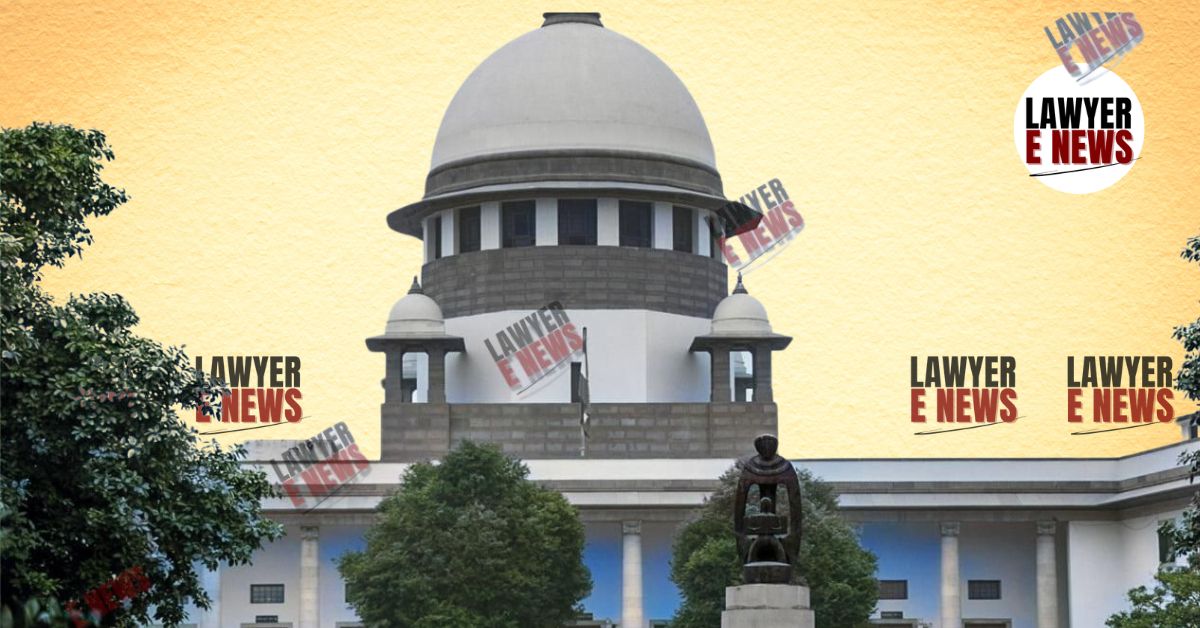-
by Admin
16 February 2026 1:47 PM



“Only four generic questions were asked in a mechanical manner… the serious procedural irregularity has caused grave prejudice and vitiates the conviction” — In a major ruling reaffirming the critical role of fair trial procedures, the Supreme Court of India set aside the convictions of three individuals convicted in a high-profile 1982 fraud case involving fake transport receipts and loss to the State Bank of India. The Court held that the trial was vitiated due to grave procedural irregularities, particularly the failure to properly examine the accused under Section 313 of the Code of Criminal Procedure, and further accepted the claim of juvenility of one of the accused.
The judgment, authored by Justice Ujjal Bhuyan, with Justice Abhay S. Oka concurring, delivers a powerful message on the non-negotiable requirement of compliance with principles of natural justice and due process, especially when liberty and criminal liability are at stake.
The case dates back to the period September to December 1982, during which the accused — Ramji Prasad Jaiswal and his two sons, Bal Mukund Jaiswal and Ashok Kumar Jaiswal — were alleged to have conspired with certain bank officials and private individuals to fraudulently secure bank payments by submitting fake consignment notes in the name of M/s Rohtas Carriers, a defunct transport firm. The alleged fraud caused a loss of ₹13.29 lakhs to State Bank of India, Agriculture Market Yard Branch, Mohania, Bihar.
In 2006, a CBI Special Court convicted the appellants under Sections 420, 468, 471, and 120B of IPC and Section 5(2) read with Section 5(1)(d) of the Prevention of Corruption Act, 1947, sentencing them to concurrent rigorous imprisonment terms. The Patna High Court upheld the conviction in 2011.
The matter came before the Supreme Court via Special Leave Petition (Criminal) No. 2629 of 2012.
Court’s Analysis on Section 313 CrPC Violation: “A Mechanical Recording That Violated Audi Alteram Partem”
The Court’s primary ground for setting aside the conviction rested on serious non-compliance with Section 313 CrPC, which mandates that all incriminating evidence must be put to the accused to allow them a fair opportunity to explain or rebut.
The Court found that only four vague and general questions were asked to the accused during their Section 313 CrPC examination — none of which specifically addressed the key evidence that had emerged during the trial.
Justice Bhuyan observed: “Four questions generally were put to the appellants, that too, in a most mechanical manner. These questions did not reflect the specific prosecution evidence which came on record qua the appellants... This caused serious prejudice.”
Quoting settled jurisprudence, the Court reiterated that: “The accused must be given an opportunity to explain each incriminating circumstance appearing in the evidence against him. Failure to do so strikes at the heart of the fair trial guarantee.”
The Court referred to precedents such as Shivaji Sahabrao Bobade v. State of Maharashtra (1973), Dharnidhar v. State of U.P. (2010), and Raj Kumar v. State (NCT of Delhi) (2023), stating that such omission vitiates the trial if it leads to prejudice — which it clearly did in this case.
Juvenility Claim Accepted: “Appellant No. 3 Was a Juvenile in 1982”
The Court also dealt with the plea of juvenility raised by Appellant No. 3, Bal Mukund Jaiswal, for the first time before the Supreme Court.
His matriculation certificate showed his date of birth as 24.12.1965, which meant he was 17 years old in 1982 when the offence occurred. The CBI itself confirmed the genuineness of the certificate. The Court had earlier directed an inquiry under Section 7A of the Juvenile Justice Act, 2000, and the Special Judge’s report conclusively held the appellant was a juvenile on the date of the offence.
Justice Bhuyan stated:
“It is established now that appellant No. 3 was a juvenile on the date of commission of the offence... In the circumstances, it is neither possible nor feasible to remand the case of appellant No. 3 to the concerned Juvenile Justice Board... the conviction and sentence qua him are hereby set aside.”
Remand Not Feasible After Four Decades: “Reviving the Trial Now Would Defeat Justice”
The Court firmly rejected the suggestion that the trial be restarted from the Section 313 stage, given the extraordinary delay of over 40 years since the commission of the alleged offence.
“At this distant point of time, instead of aiding the cause of justice, it will lead to miscarriage of justice if the case is remanded...”
Thus, the Court held that the accused are entitled to the benefit of doubt, and the entire conviction is unsustainable.
Conviction and Sentence Set Aside, Bail Bonds Cancelled
The Supreme Court, emphasizing that fair trial safeguards are not mere formalities, concluded:
“We set aside the judgment and order of the trial court dated 29.05.2006 and that of the High Court dated 24.11.2011... The criminal appeal is accordingly allowed.”
The Court cancelled the bail bonds of the appellants and directed that they be discharged from all criminal liability.
This judgment reasserts a foundational principle: compliance with procedural due process, especially under Section 313 CrPC, is integral to a valid conviction. The decision is a warning to trial courts against casual or mechanical compliance, as such failures can overturn otherwise established prosecutions.
It also affirms the position that claims of juvenility can be raised at any stage, and courts are duty-bound to address them in accordance with law, even decades later.
Date of Decision: May 20, 2025
